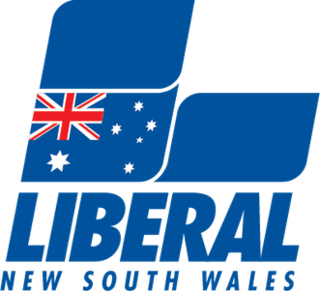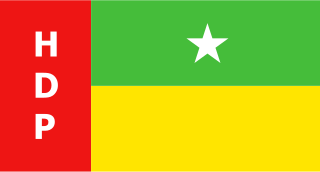
The Democratic Republic of Afghanistan (DRA), renamed the Republic of Afghanistan in 1987, was the Afghan state during the one-party rule of the People's Democratic Party of Afghanistan (PDPA) from 1978 to 1992. It relied heavily on assistance from the Soviet Union for most of its existence, especially during the Soviet–Afghan War.
Liberal Democrats may refer to:
A national unity government, government of national unity (GNU), or national union government is a broad coalition government consisting of all parties in the legislature, usually formed during a time of war or other national emergency. A unity government according to the principles of consensus democracy lacks opposition, or opposition parties are too small and negligible.
Republican Party is a name used by many political parties around the world, a reference to Republicanism, a political ideology.
Within Russian political parties, liberal parties advocate the expansion of political and civil freedoms and mostly oppose Vladimir Putin. In Russia, the term "liberal" can refer to wide range of politicians—simultaneously to Thatcherism/Reaganomics-related pro-capitalism conservative politicians, to centre-right liberal politicians and to left-liberal politicians. The term "liberal democrats" is often used for members of the far-right nationalist Liberal Democratic Party of Russia. There are Russian opposition and pro-government liberal political parties in Russia. Pro-government liberal politicians support Putin's policy in economics.
This article gives information on liberalism worldwide. It is an overview of parties that adhere to some form of liberalism and is therefore a list of liberal parties around the world.
Peter Alan Stollery is a former Canadian politician and businessman.
Though Afghanistan has had democratic elections throughout the 20th century, the electoral institutions have varied as changes in the political regime have disrupted political continuity. Elections were last held under the Islamic Republic of Afghanistan, which was deposed by the Taliban in August 2021. The Taliban dissolved the Elections Commission in December 2021. In May 2022, when asked if the Taliban would hold elections, First Deputy Leader Sirajuddin Haqqani said the question was "premature". All political parties have been banned since August 2023.

The New South Wales Liberal Party, officially called the Liberal Party of Australia, New South Wales Division, and colloquially known as the NSW Liberal Party, is the state division of the Liberal Party of Australia in New South Wales. The party is currently in Opposition in New South Wales in a coalition with the National Party. The party is part of the federal Liberal Party which is in opposition on the mainland of Australia, with Tasmania being the exception.

The Alliance of Democrats was a loose political international which operated from 2005 to 2012. While it did not publish an official manifesto, it consisted of a broad array of political parties that identified as centre-right, centrist, and centre-left. It was founded by the United States Democratic Party, the European Democratic Party (EDP) and the Council of Asian Liberals and Democrats (CALD).
Advisory Commission of National and Democratic Parties was an alliance of political parties in Afghanistan, founded in October 2004. The provisional spokesperson of the AC-NDP was Zulfeqar Khan Omid.

The Hazara Democratic Party (HDP) : is a political party of the Hazara people in Pakistan. It is mainly active in Quetta city, where up to half a million Hazara currently reside.

General elections were held in the Netherlands on Wednesday 9 June 2010. This was triggered by the fall of Prime Minister Jan Peter Balkenende's fourth cabinet on 20 February with Queen Beatrix accepting the resignation of the Labour Party (PvdA) ministers on 23 February. The conservative-liberal People's Party for Freedom and Democracy (VVD), led by Mark Rutte, won the largest number of seats in the House of Representatives while the social-democratic PvdA, led by Job Cohen, came a narrow second. The election was also noted for the rise of the Party for Freedom (PVV), which came third, led by controversial politician Geert Wilders. On the other hand, Balkenende's Christian Democratic Appeal (CDA) saw a poor result, losing half its seats and dropping from first to fourth place. The Socialist Party (SP) also lost seats. Notably, the 31 seats won by the VVD was its most since 1998, and the one-seat margin between the VVD and PvdA is the closest on record.
Progressivism is a political philosophy and movement that seeks to advance the human condition through social reform – primarily based on purported advancements in social organization, science, and technology. Adherents hold that progressivism has universal application and endeavor to spread this idea to human societies everywhere. Progressivism arose during the Age of Enlightenment out of the belief that civility in Europe was improving due to the application of new empirical knowledge.

A popular front is "any coalition of working-class and middle-class parties", including liberal and social democratic ones, "united for the defense of democratic forms" against "a presumed Fascist assault". More generally, it is "a coalition especially of leftist political parties against a common opponent". But other alliances have used the term. And not all leftist or anti-fascist coalitions use the term "popular front".

Maryam Monsef is a former Afghan Canadian politician. She served as the member of Parliament for the riding of Peterborough—Kawartha from 2015 to 2021 as a member of the Liberal Party of Canada.

Russian legislative elections are a procedure of determining the composition of the State Duma, the lower house of the Russian parliament, for the next five years through universal, direct, and secret voting of 450 deputies.
This page is based on this
Wikipedia article Text is available under the
CC BY-SA 4.0 license; additional terms may apply.
Images, videos and audio are available under their respective licenses.








